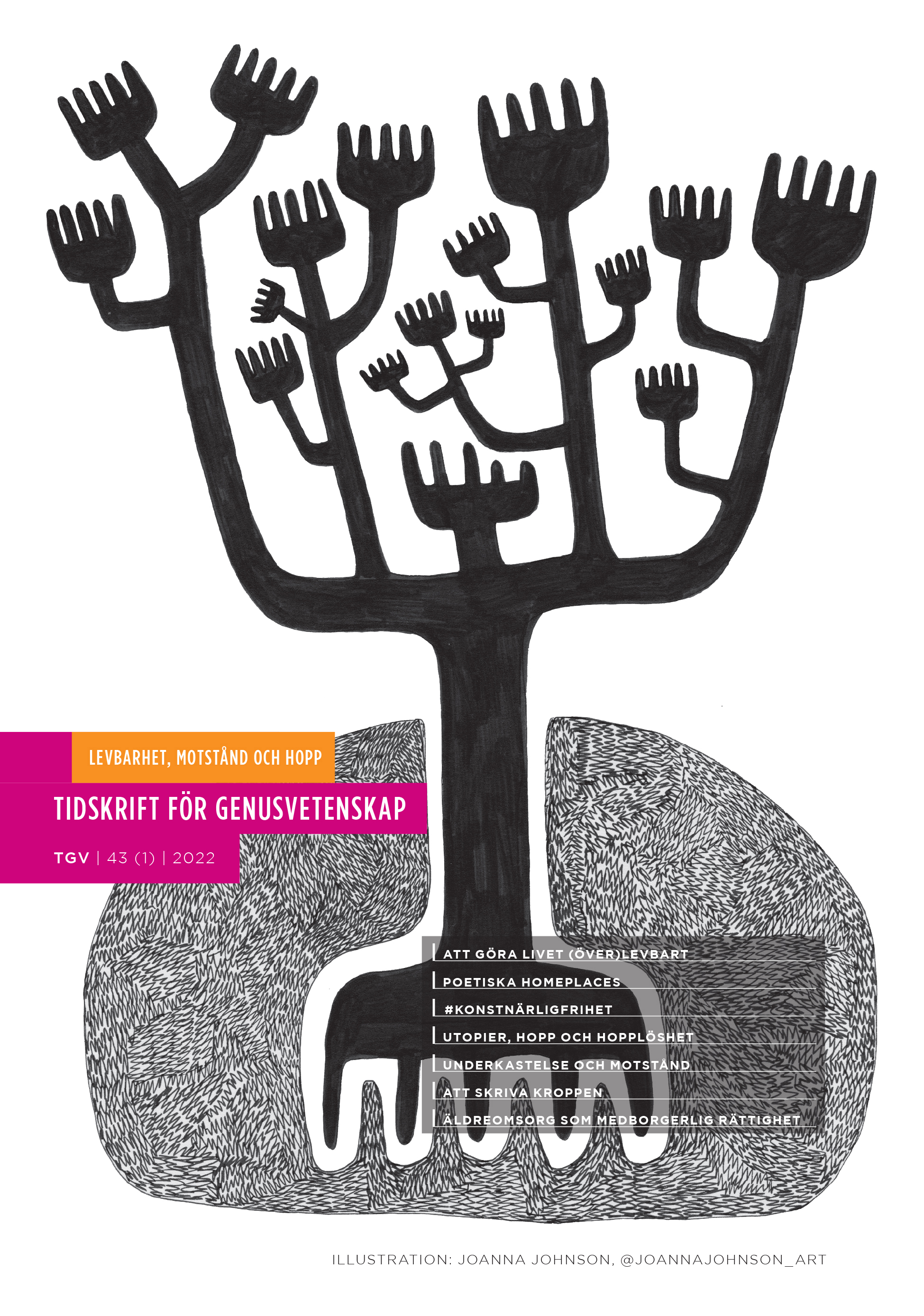Poetiska homeplaces: Reflektioner och samtal om muslimsk subjektivitet inom spoken word och poesi
DOI:
https://doi.org/10.55870/tgv.v43i1.10348Nyckelord:
Spoken word, poetry, subjectivity, muslim women, homeplaceAbstract
The last decade saw a renaissance of the artform called spoken word poetry through several spoken word projects in the suburbs of Swedish cities. A group of women who have been prominent in using these platforms as a way to highlight their voices and stories are young Muslim women from primarily from socioeconomically disadvantaged suburbs. This article focuses on a few of these voices. Based on a multimodal methodology including interviews with poets and readings of their work, this article sets out to understand how the young women use their poetry to formulate their subjectivity and issues that that matter to them. The poets and spoken word artists can be seen as knotworkers who use various platforms and tools in order to share their stories and reflections. The study shows how spoken word platforms have played an important role in creating a space where young poets find creative homeplaces and craft their own positions as poets and the kind of poetry they want to engage in. Through personal experiences and stories, the poets bind together several societal issues such as antiblack racism, antimuslim racism, classism, and patriarchy. Muslim subjectivity is articulated through the use of language and certain religious definitions such as references to prayers. Poetry is also used as a way to create feminist archives of missing stories. This study also highlights how double consciousness is at work where the poets reflect on certain difficult topics and how they chose to engage with them through their writing.
Nedladdningar
Referenser
Abdullahi, Maimuna (2016) Forgotten Women: The Impact of Islamophobia on Muslim Women in Sweden. Brussels: European Network against Racism. forgottenwomenpublication_lr_final_with_latest_corrections.pdf (enar-eu.org) [8 december 2022].
Ahmed, Sara (2014) The cultural politics of emotion. Edinburgh: Edinburgh University Press.
Vargas Alaeb, Nachla, Rashid, Nina och Ruz, Daniela (red) (2018) Revolution poetry. Stockholm: Bonnier Carlsen.
Alcoff, Linda (1999) Towards a phenomenology of racial embodiment. Radical Philosophy 95(May): 15–26.
Anyuru, Johannes (2017) Sommar och vinter i P1. Sveriges Radio. 14 juli 2017.
Arif, Arazo (2019) Looney talks [Podcast]. 12 november 2019. https://play.acast.com/s/looneytalkspodcast/looneytalksmedmonamonasar.
Arif, Arazo (2020) Mörkret inuti fukten. Stockholm: Albert Bonniers förlag.
Axner, Marta (2015) Representationer, stereotyper och nyhetsvärdering. Rapport från medieanalys om representationer av muslimer i svenska nyheter. Solna: Diskrimineringsombudsmannen.
Chepp, Valerie (2012) Art as public knowledge and everyday politics: The case of African American spoken word. Humanity & Society 36(3): 220–250. DOI: https://doi.org/10.1177/0160597612451240
Cho, Lily och Henders, Susan (red) (2014) Human Rights and the Arts: Perspectives on Global Asia. Lanham: Lexington Books.
Collins, Patricia Hill (2002) Black feminist thought: Knowledge, consciousness, and the politics of empowerment. New York: Routledge.
Curwood, Jen Scott och Jones, Katelyn (2022) A bridge across our fears: understanding spoken word poetry in troubled times. Literacy 56(1): 50–58. DOI: https://doi.org/10.1111/lit.12270
Du Bois, W. E. B (1989 [1903]) The Souls of Black Folk. New York: Avenel.
Engeström, Yrjö, Engeström, Ritva, och Vähääho, Tarja (1999) When the center does not hold: The importance of knotworking. Chaiklin, Seth, Hedegaard, Mariane och Jensen, J Uffe (red) Activity theory and social practice: Cultural historical approaches. Aarhus: Aarhus University Press.
Fraiberg, Steven (2013) Reassembling technical communication: A framework for studying multilingual and multimodal practices in global contexts. Technical Communication Quarterly 22(1):10–27. DOI: https://doi.org/10.1080/10572252.2013.735635
Farahani, Fataneh (2017) Gender, Sexuality, and Diaspora. New York: Routledge. DOI: https://doi.org/10.4324/9780203795613
Gardell, Mattias (2010) Islamofobi. Stockholm: Leopard.
hooks, bell (1990) Yearning: race, gender, and cultural politics. Boston Mass.: South End Press
Hurdley, Rachel och Dicks, Bella (2011) In-between practice: working in the “third space” of sensory and multimodal methodology. Qualitative Research 11(3): 277–292. DOI: https://doi.org/10.1177/1468794111399837
Jobe, Mariama (2018) Sannu. Type&Tell.
Krishnamurti, Sailaja (2014) Human Rights and the Poetics of “Migritude”. Cho, Lily och Henders, J Susan (red) Human Rights and the Arts: Perspectives on Global Asia. Lanham: Lexington Books.
Lee, Mara (2014) När Andra skriver: Skrivande som motstånd, ansvar och tid. Avhandling. Göteborg: Glänta produktion.
Liliequist, Evelina (2020) Digitala förbindelser: Rum, riktning och queera orienteringar. Avhandling. Umeå: Institutionen för kultur- och medievetenskaper, Umeå universitet.
Mahmood, Saba (2005) Politics of piety: The Islamic revival and the feminist subject. Princeton: Princeton University Press.
Mahmood, Saba (2009) Feminism, democracy, and empire: Islam and the war on terror. Herzog, Hanna och Braude, Ann (red) Gendering religion and politics. Palgrave Macmillan: New York. DOI: https://doi.org/10.1057/9780230623378_9
Meer, Nasar (2010) Citizenship, identity and the politics of multiculturalism: The rise of Muslim consciousness. New York: Palgrave. DOI: https://doi.org/10.1057/9780230281202
Meer, Nasar (2019) WEB Du Bois, double consciousness and the “spirit” of recognition. The Sociological Review 67(1): 47–62. DOI: https://doi.org/10.1177/0038026118765370
Meer, Nasar och Modood, Tariq (2010) The racialization of Muslims. Sayyid, Salman and Vakil, Abdoolkarim (red) Thinking through Islamophobia: Global Perspectives. New York: Columbia University Press.
Monasar, Mona (2019) Modersmål. Stockholm: Natur&Kultur.
Motturi, Aleksander (2007) Etnotism: en essä om mångkultur, tystnad och begäret efter mening. Göteborg: Glänta produktion.
Oumlil, Kenza (2013) “Talking Back”: The poetry of Suheir Hammad. Feminist Media Studies 13(5): 850–859. DOI: https://doi.org/10.1080/14680777.2013.838368
Sahin, Burcu (2018) Broderier. Stockholm: Albert Bonniers förlag.
Sameh, Catherine (2019) Axis of Hope: Iranian Women’s Rights Activism Across Borders. Washington: University of Washington Press.
Sernhede, Ove, León Rosales, René och Söderman, Johan (2019) ”När betongen rätar sin rygg”: ortenrörelsen och folkbildningens renässans: från stigmatisering till kunskapssökande och social mobilisering. Göteborg: Daidalos.
Sinno, Nadine (2017) “Dammit, Jim, I’m a Muslim Woman, Not a Klingon!”: Mediating the Immigrant Body in MohjaKahf’s Poetry. MELUS 42(1):1 16–138. DOI: https://doi.org/10.1093/melus/mlw061
Walkington, Lori (2021) Speak about it, be about it: Spoken-word poetry communities and transformative social justice. Critical Criminology 29(3): 649–666. DOI: https://doi.org/10.1007/s10612-020-09510-8
Publicerad
Referera så här
Nummer
Sektion
Licens
Copyright (c) 2022 Mehek Muftee

Detta verk är licensierat under en Creative Commons Erkännande-IckeKommersiell 4.0 Internationell-licens.
Författaren/författarna behåller copyright till verket.





